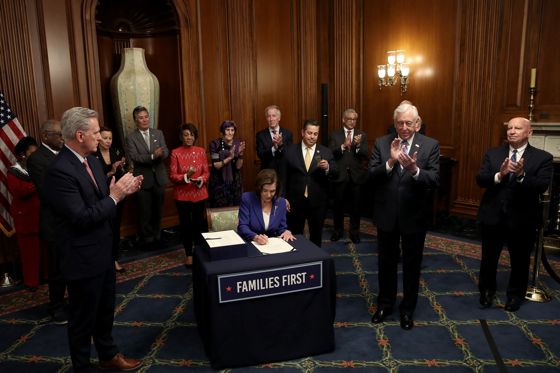March in the United States had to be the worst month on record for hotels in modern history. April is poised to be worse. As I write this, two more states have issued tough mandatory stay-at-home orders.
For hotel owners, this means more scrambling to make mortgage payments and retain valued staff members. Is there any hope on the horizon? There is.
Contributed by Brian Mahany, MahanyLaw, San Antonio, Texas; Milwaukee, Wisconsin
Congress and state governments are racing to protect jobs and businesses and to preserve the U.S. economy. Everyone understands the particular strains suffered by the hospitality industry. Although relief programs centered on the coronavirus pandemic change daily, there is much needed good news for hotel owners. In the paragraphs below we discuss the Coronavirus Aid, Relief and Economic Security Act (CARES), mortgage concerns and business interruption insurance.
On March 27, President Trump signed the CARES Act, a US$2 trillion-plus business loan, tax and unemployment bill. Many provisions of the law should prove helpful to hotel owners and their employees.
Tax credits for employers maintaining payrolls
CARES provides powerful incentives for employers to maintain their payroll during disruptions cause by the pandemic. It does this through a refundable tax credit for businesses harmed by government emergency orders or businesses who saw their gross receipts decline by more than 50%. Almost all hotels in the United States qualify.

The tax credit is a payroll tax credit equal to 50% of qualified wages. It is available up to US$10,000 per employee between March 13 and December 31, 2020. Different rules apply depending on whether the employer has more or less than 100 employees.
Unlike many tax credits, this one is refundable. That means that even if the credit is larger than the tax you owe, you can get a check for the difference. For example, if you owe US$10,000 in taxes and qualify for a US$20,000 credit, you would receive a US$10,000 refund.
CARES also gives employers an interest free grace period of up to two years to pay FICA and Social Security taxes.
Paycheck protection program
Small hotels with 500 or less employees can also receive loans for most payroll costs as well as other business expenses. No personal guarantee is necessary and loans are available up to 2.5 times the average payroll costs over the last year. There is a US$10 million cap. Rates won’t exceed 4% and your first payment can deferred at least six months.
If you keep your staff on the payroll, part of the loan can be forgiven. Already laid people off? You might be able to rehire them and still qualify.
Larger hotels with between 501 and 10,000 employees can also qualify for payroll relief.
These payroll loans are available from SBA approved banks and credit unions.
SBA economic injury disaster loans
Hotels with 500 or fewer workers may also qualify for SBA Economic Injury Disaster Loans. Loans are capped at US$2 million. Loans of less than US$200,000 do not require a personal guarantee. Rates are quite reasonable (3.75%) and can be amortized for up to 30 years.
Many of the typical stringent SBA lending requirements have been eliminated. The goal of Congress is to get relief to the hardest hit businesses including hotels as quickly as possible.
Payroll grants
Emergency US$10,000 grants are available with as little as three days’ notice. Repayment can be waived if used for payroll or mortgage debt.
The fine print
The government has reduced much of the red tape typically associated with relief efforts but there is still some fine print. Make sure you speak to a lawyer and a tax advisor to see what relief is best for you.
Mortgage relief
Most hotel owners made their April payments but absent a miracle, won’t make May’s payment. Even if a coronavirus cure were found tomorrow, it will likely take months for the hospitality industry to get back to normal.
Congress and several states are discussing additional relief for hotel owners. For now, here is our best advice:
Hotels with traditional bank financing will probably be able to work something out with the bank. The Federal Reserve and Congress has made sure that banks have plenty of liquidity and are encouraging banks to work with borrowers.
Typically, banks ask borrowers who are in default to sign a “forbearance” letter. We urge hotel owners to have those agreements reviewed by a lawyer. Many lenders include language that waives all claims you may have against the lender. The “deal” you make today could come back and bite you if things don’t improve quickly.
There are several states that have imposed foreclosure or eviction stays but those often only apply to residential properties and don’t stop default interest and fees from accruing. Don’t rely on a foreclosure moratorium, now is the time to work something out with your lender.
Many hotels have so called CMBS financing (Commercial Mortgage Backed Securities). These loans are much trickier and the loan “servicers” that service the loans are not regulated. Seek help from an experienced CMBS lawyer.
Business interruption insurance
Many hotels have business interruption policies. This insurance makes up lost profits if your business is interrupted or if a government authority mandates a closure or prevents people from traveling. Typically, these policies require a physical loss.
Although we believe that contamination from coronavirus is a physical loss, we know insurance carriers are gearing up to deny claims. If your claim is denied, demand the denial be in writing and specify the reasons for the denial of coverage. Then seek a lawyer. Many policies require that claims be filed quickly.
Summary
Everyone in the hotel industry is suffering. Take a deep breath. See what insurance and government grants and loans are available and talk to your lender. There is a temptation when panicked to act impulsively. Know that you are not alone.
